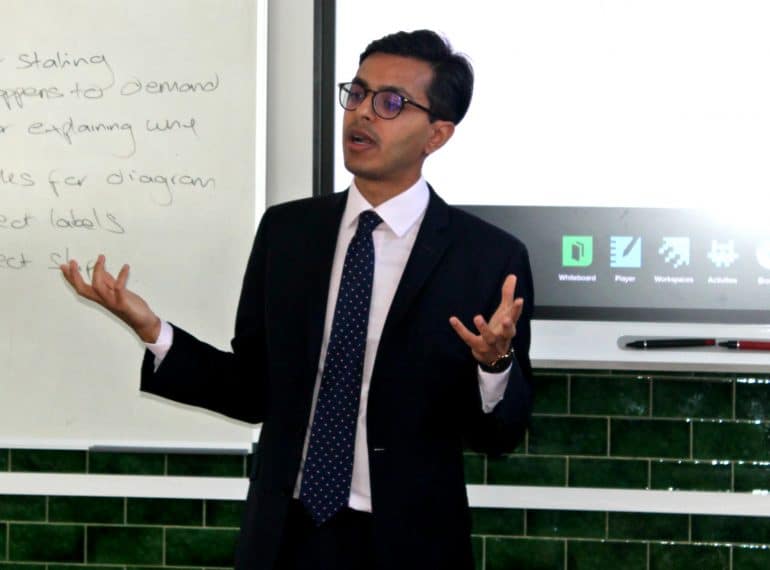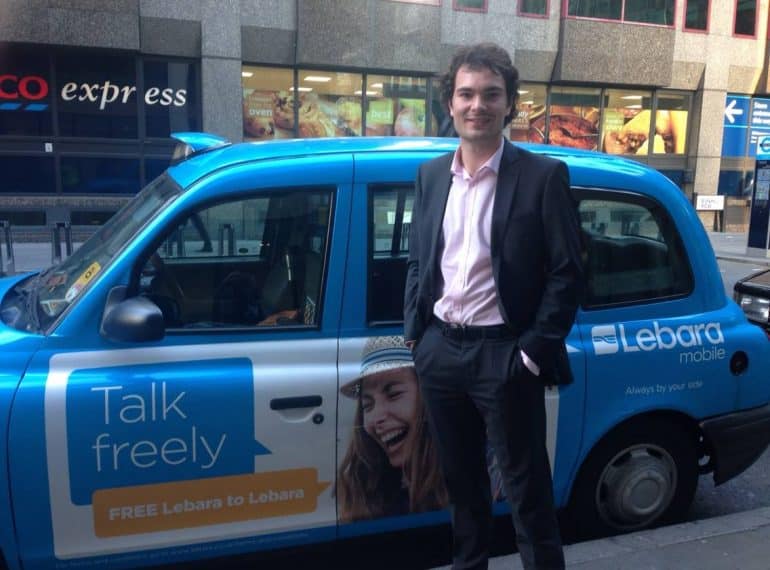
After graduating from Cambridge in 2013, Charlie Scutt has gone on to build a successful career with a company dedicated to meeting the needs of economic migrants worldwide.
Charlie (OE 2003–2010) works for London-based Lebara, where he relishes his “funky” role as a Scrum Master & Delivery Manager. The company is known principally as a telecommunications company, although Charlie’s work has mainly been in its money transfer business.
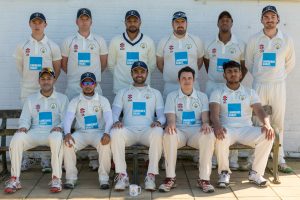 While at university, he was Girton College Cricket Club First XI captain. He has continued playing since, and three years ago made the move from his childhood club, Potters Bar CC, to the thriving Old Elizabethans CC, where he is a wicketkeeper. He is pictured here (back row, far right) with the current Old Elizabethans First XI. The vice captain (Front Row, Second from the right) is OE Paul Lissowski, who was in the year above Charlie.
While at university, he was Girton College Cricket Club First XI captain. He has continued playing since, and three years ago made the move from his childhood club, Potters Bar CC, to the thriving Old Elizabethans CC, where he is a wicketkeeper. He is pictured here (back row, far right) with the current Old Elizabethans First XI. The vice captain (Front Row, Second from the right) is OE Paul Lissowski, who was in the year above Charlie.
“I left QE in 2010 to study Geography at Cambridge, and without the support and guidance from the School – in particular Mr Enright [now Headmaster Neil Enright] and Mrs Macdonald [now Assistant Head Anne Macdonald] – that certainly wouldn’t have been possible,” says Charlie. “The reason I chose to do Geography was quite simply it was the subject I enjoyed the most.
“I like the fact that Geography covers a very diverse range of areas and have always seen myself as somewhat of a ‘generalist’. Choosing it for my degree made perfect sense as it gave me the flexibility to continue learning about a breadth of topics. I certainly didn’t have my future career in mind at this point and by no means had my future planned out (or even do to this day if I’m totally honest!). My goal has always been to try to do what I enjoy, but make sure I do it to the best of my ability!
“My three years in Cambridge were brilliant and I particularly enjoyed the college system whereby your college acts almost as your family away from home. Whilst the academic side of Cambridge was undoubtedly tough it was hugely rewarding, and it wasn’t all work.
“There was more than enough time to have a great social life and play a lot of sport. I played football (badly!) for my college and also played cricket for the university in my second and third years, mainly for the university Second XI although I did manage one appearance for the Cambridge University Blues (First XI) in my final year.”
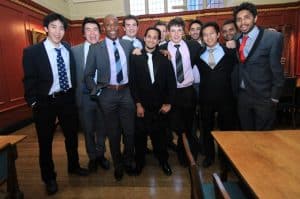 Charlie is pictured here, fourth from left, with a group of OEs who went to Cambridge with him. They arranged this reunion dinner in 2013, when he was in his third year.
Charlie is pictured here, fourth from left, with a group of OEs who went to Cambridge with him. They arranged this reunion dinner in 2013, when he was in his third year.
“After leaving Cambridge I was none-the-wiser on where I wanted to go career-wise, so spent the summer trying to navigate the baffling world of graduate jobs!” After receiving offers from a number of companies, he eventually decided to join Lebara on a six-month internship, choosing the company because it offered a broad role which suited his generalist mindset. “It turned out to be quite a good decision as I’m still there five years later!”
Throughout that time he has fulfilled a number of roles for the telecoms company. “Alongside the ability to call home, one of the next most significant needs of, in particular, economic migrants is the ability to send money home. From this idea, Lebara Money was born. Working as part of the Lebara Money team was a great experience as, whilst Lebara is a large established company, the Money team always acted as a semi-autonomous business unit; a ‘start-up’ within a larger organisation and, in my opinion, the best of both worlds.
“The goal was to provide an easy and secure way to send money home online, via web or mobile app. I worked on this product for four-and-a-half years, starting off in Operations Management (helping to manage customer services, fraud prevention, minor maintenance updates to the website etc) before transitioning into Project Management.
“I have increasingly focused on the technology aspects of the business though Delivery Management and (the funkily named) Scrum Mastering. This latest role essentially involves managing the end-to-end delivery of all ‘technology’ elements of the business. Having not come from a typical ‘tech’ background, this was an interesting challenge, but one I thoroughly enjoyed.
“I particularly enjoy the ‘Scrum Master’ element, which essentially means managing your team in a manner whereby, rather than planning all the details of a project months or years in advance, you break everything down into small iterations and focus solely on what needs to be done over the next week or two. At the end of each iteration (referred to as a ‘sprint’) you then review what you have built and your original goals, then adapt your goals for the next ‘sprint’ based on what you have learned from the previous one. This ensures continuous learning, greater ability to adapt to change and ultimately a more agile team than you would have using traditional long-term project management methodologies where the end goal – perhaps a year or more down the line – is defined on day 1.
“Methodologies such as ‘scrum’, which focus on making a team more agile, have now become the go-to way of managing software development teams across most industries, with everyone from banks to video game developers looking to roll it out (with varying degrees of success!).
“I would never have expected my career to have evolved in the way it has and it certainly shows you don’t need to do Computer Science, Software Engineering or another ‘tech’-focused degree to end up working in the technology sector.”
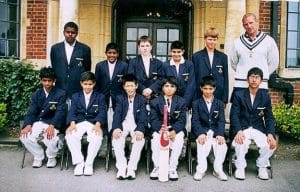 Outside of work, his decision to switch to Old Elizabethans CC has, he says, proved to be a fruitful one, as “two promotions in three years see the First XI playing the highest level of cricket in the club’s history”. Charlie is pictured here, back row centre, in his Year 7 cricket photo at QE.
Outside of work, his decision to switch to Old Elizabethans CC has, he says, proved to be a fruitful one, as “two promotions in three years see the First XI playing the highest level of cricket in the club’s history”. Charlie is pictured here, back row centre, in his Year 7 cricket photo at QE.
“The club also runs highly successful Second, Third and Sunday XIs, alongside a flourishing Colts setup for kids aged 11-17, which means there are opportunities regardless of your age or ability. I’d encourage any cricketers at QE to consider joining Old Elizabethans CC as it offers a perfect opportunity for students to supplement the coaching they receive at School. It also provides the chance to continue playing regular cricket after the School season finishes each year in early July and then even into their adult life once they have left QE.”
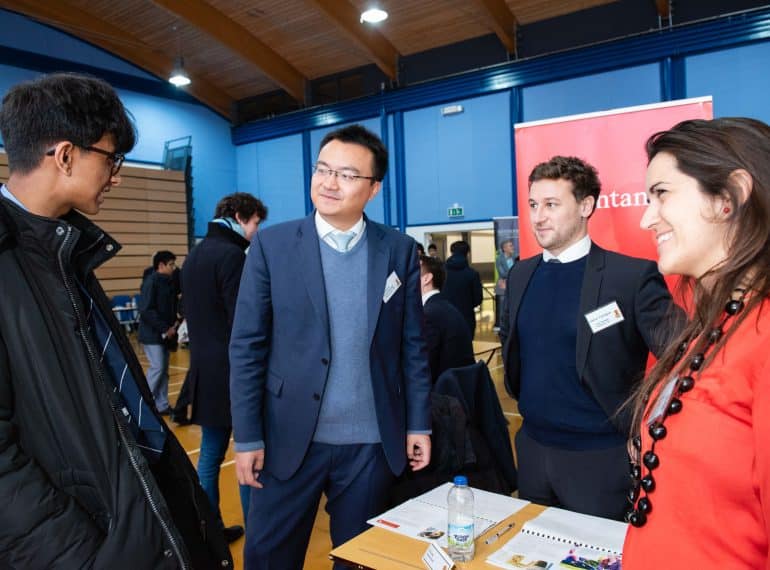
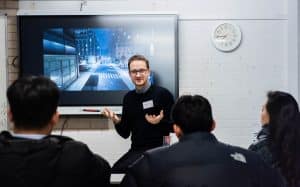 Several visiting experts gave structured presentations, while on the main conference floor, boys and their parents seized the opportunity to ask questions of volunteers.
Several visiting experts gave structured presentations, while on the main conference floor, boys and their parents seized the opportunity to ask questions of volunteers.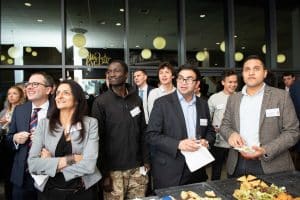 opportunities. There was a real buzz out on the convention floor. It is always incredibly useful for the boys to be able to seek advice from those who have been at the School and who have had the experience of establishing themselves in their chosen fields.”
opportunities. There was a real buzz out on the convention floor. It is always incredibly useful for the boys to be able to seek advice from those who have been at the School and who have had the experience of establishing themselves in their chosen fields.”
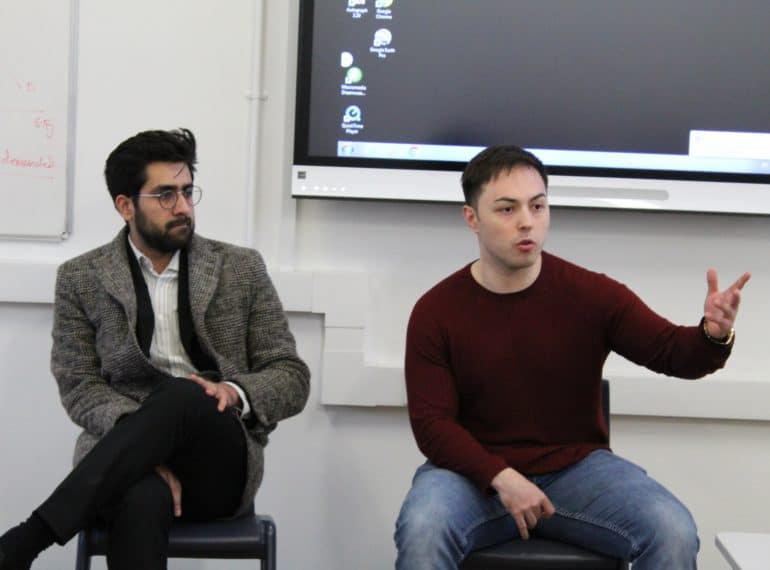
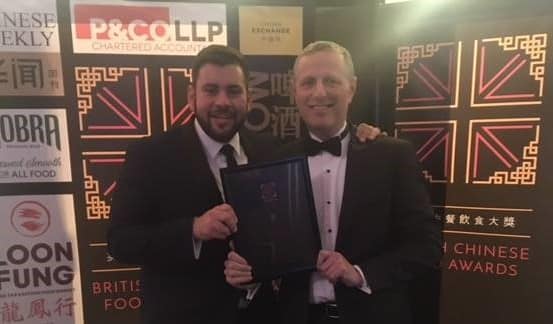
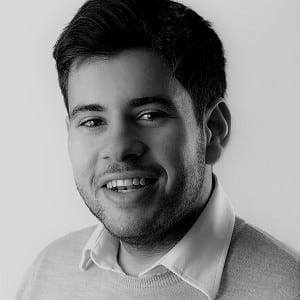 Two years later, Phil was appointed as Zing Zing’s Operations Director, becoming MD a year after that. He worked on delivering an ambitious roll-out plan that has already seen the business grow from two sites to six since his arrival, which followed shortly after record-breaking Crowdcube fundraising.
Two years later, Phil was appointed as Zing Zing’s Operations Director, becoming MD a year after that. He worked on delivering an ambitious roll-out plan that has already seen the business grow from two sites to six since his arrival, which followed shortly after record-breaking Crowdcube fundraising.
 While at university, he was Girton College Cricket Club First XI captain. He has continued playing since, and three years ago made the move from his childhood club, Potters Bar CC, to the thriving Old Elizabethans CC, where he is a wicketkeeper. He is pictured here (back row, far right) with the current Old Elizabethans First XI. The vice captain (Front Row, Second from the right) is OE Paul Lissowski, who was in the year above Charlie.
While at university, he was Girton College Cricket Club First XI captain. He has continued playing since, and three years ago made the move from his childhood club, Potters Bar CC, to the thriving Old Elizabethans CC, where he is a wicketkeeper. He is pictured here (back row, far right) with the current Old Elizabethans First XI. The vice captain (Front Row, Second from the right) is OE Paul Lissowski, who was in the year above Charlie. Charlie is pictured here, fourth from left, with a group of OEs who went to Cambridge with him. They arranged this reunion dinner in 2013, when he was in his third year.
Charlie is pictured here, fourth from left, with a group of OEs who went to Cambridge with him. They arranged this reunion dinner in 2013, when he was in his third year. Outside of work, his decision to switch to Old Elizabethans CC has, he says, proved to be a fruitful one, as “two promotions in three years see the First XI playing the highest level of cricket in the club’s history”. Charlie is pictured here, back row centre, in his Year 7 cricket photo at QE.
Outside of work, his decision to switch to Old Elizabethans CC has, he says, proved to be a fruitful one, as “two promotions in three years see the First XI playing the highest level of cricket in the club’s history”. Charlie is pictured here, back row centre, in his Year 7 cricket photo at QE.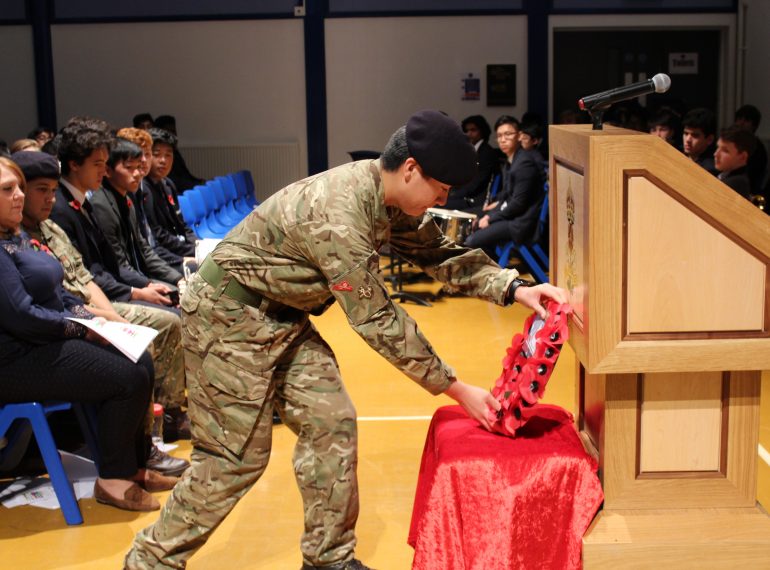
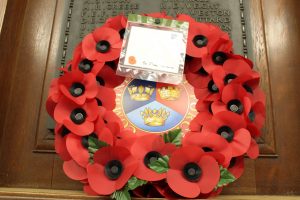 The ceremony featured music, poetry and a procession by the School’s Combined Cadet Force (CCF). The silence at 11 o’clock was heralded by six of QE’s senior trumpeters sounding the Last Post; they played Reveille to signal the end of the silence.
The ceremony featured music, poetry and a procession by the School’s Combined Cadet Force (CCF). The silence at 11 o’clock was heralded by six of QE’s senior trumpeters sounding the Last Post; they played Reveille to signal the end of the silence.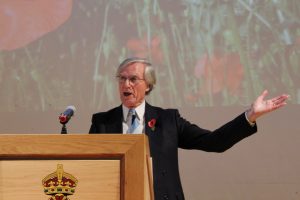 In an address to the assembly, Old Elizabethan and Governor Ken Cooper (1942-50), a former officer in the Royal Warwickshire Regiment, charted the course of the war, making clear the scale of the conflict and its great cost. He explained how the emergence of trench warfare on the Western Front led to combat that lasted for months and years yet resulted in minimal or no territorial gains for either side.
In an address to the assembly, Old Elizabethan and Governor Ken Cooper (1942-50), a former officer in the Royal Warwickshire Regiment, charted the course of the war, making clear the scale of the conflict and its great cost. He explained how the emergence of trench warfare on the Western Front led to combat that lasted for months and years yet resulted in minimal or no territorial gains for either side.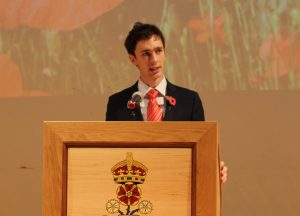 The assembly, which took place on Friday, was organised and compèred by English teacher, Micah King, an Extra-curricular Enrichment Tutor. He began with these words: “Welcome to this assembly to commemorate Remembrance Day. In almost exactly 48 hours’ time, it will be the 11th hour, of the 11th day, of the 11th month.
The assembly, which took place on Friday, was organised and compèred by English teacher, Micah King, an Extra-curricular Enrichment Tutor. He began with these words: “Welcome to this assembly to commemorate Remembrance Day. In almost exactly 48 hours’ time, it will be the 11th hour, of the 11th day, of the 11th month.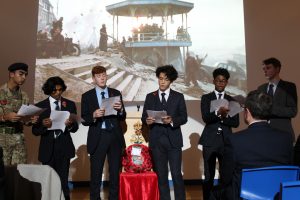 The assembly featured:
The assembly featured: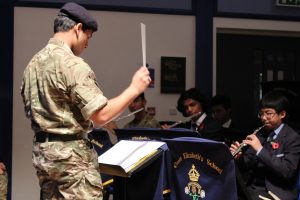 Before the retiring procession to the accompaniment of Israel Kamakawiwo’ole’s version of Somewhere Over the Rainbow, Mr King said that if the boys would use their “gifts and talents as leaders to share the message of peace, then that would fill me with a deep sense of hope and optimism for the future”.
Before the retiring procession to the accompaniment of Israel Kamakawiwo’ole’s version of Somewhere Over the Rainbow, Mr King said that if the boys would use their “gifts and talents as leaders to share the message of peace, then that would fill me with a deep sense of hope and optimism for the future”.